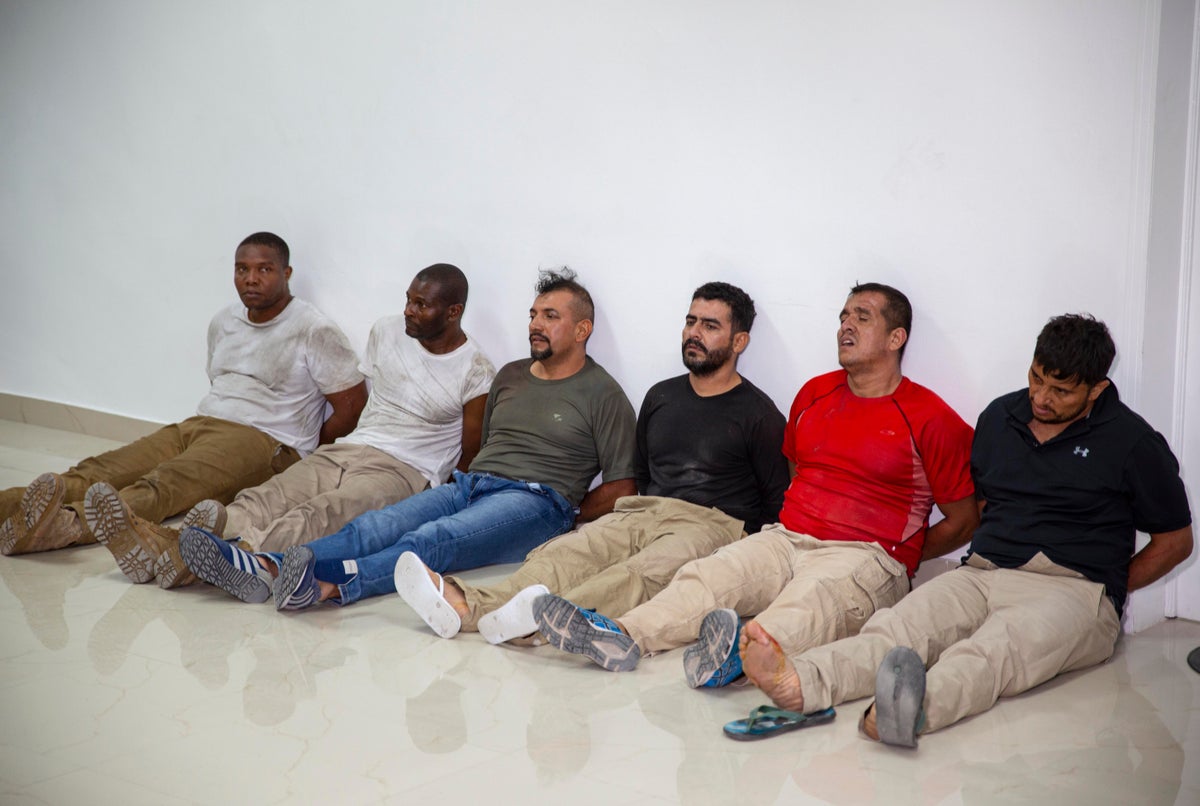
Four key suspects in the killing of Haitian President Jovenel Moïse were transferred to the United States for prosecution as the case stagnates in Haiti amid death threats that have spooked local judges, U.S. officials announced Tuesday.
The suspects now in custody of the U.S. government include James Solages, 37, and Joseph Vincent, 57, two Haitian-Americans who were among the first arrested after Moïse was shot 12 times at his private home near the capital of Port-au-Prince on July, 7 2021.
Also charged is Christian Emmanuel Sanon, an elderly pastor, doctor and failed businessman that authorities have identified as a key player. His associates have suggested he was duped by the real — and still unidentified — masterminds behind the assassination that has plunged Haiti deep into political chaos and unleashed a level of gang violence not seen in decades.
The fourth suspect was identified as Colombian citizen Germán Rivera García, 44, who is among nearly two dozen former Colombian soldiers charged in the case.
Rivera, along with Solages and Vincent, face charges including conspiring to commit murder or kidnapping outside the U.S. and providing material support and resources resulting in death, the U.S. Justice Department said.
Sanon is charged with conspiring to smuggle goods from the U.S. and providing unlawful export information. Court documents state that he allegedly shipped 20 ballistic vests to Haiti, but that the items shipped were described as “medical X-ray vests and school supplies.”
It was not immediately known if the four suspects had attorneys who could comment on the development. The men are scheduled to appear in federal court Wednesday in Miami.
A total of seven suspects in the case are now in U.S. custody. Dozens of others still languish in Haiti’s main penitentiary, which is severely overcrowded and often lacks food and water for inmates.
The case has reached a virtual standstill in Haiti, with local officials last year nominating a fifth judge to investigate the killing after four others were dismissed or resigned for personal reasons.
One judge told The Associated Press that his family asked him not to take the case because they feared for his life. Another judge stepped down after one of his assistants died under murky circumstances.
Court documents state that exactly two months before Moïse was killed, Vincent texted Solages a video of a cat “reacting alertly” to the sound of gunfire and that Solages laughed, prompting Vincent to respond: “That’s the way Jovenel will be pretty much, but (sooner) if you guys really up to it!”
The document states that Solages responded that “(this) cat will never come back,” and “trust me brother, we definitely working our final decision.”
Then in June, some 20 former Colombian soldiers were recruited to supposedly help arrest the president and protect Sanon, who envisioned himself as Haiti's new leader. Rivera was in charge of that group, the documents state.
A day before the killing, Solages falsely told other suspects that it was a CIA operation and that the mission was to kill the president, according to the documents. Shortly before the killing, authorities said, Solages shouted that it was allegedly a DEA operation to ensure compliance from the president’s security detail.
About a year after the killing, U.S. authorities say they interviewed Solages, Vincent and Rivera while they were in Haitian custody and that they agreed to talk.
The other suspects already in U.S. custody are Rodolphe Jaar, a former U.S. government informant and a Haitian businessman who was extradited from the Dominican Republic, where he was detained in January 2022.
That same month, U.S. authorities arrested Mario Antonio Palacios Palacios, a former Colombian soldier who was deported by Jamaica after fleeing there from Haiti. While en route to Colombia, he was deained by U.S. officials in Panama during a layover.
Also in January 2022, authorities arrested former Haitian Sen. John Joël Joseph, who also had fled to Jamaica.
Alfredo Izaguirre, a Miami-based lawyer for Palacios, said Tuesday's arrival of the four other suspects will postpone the trial because they all have to be tried at the same time. He said Palacios had been prepared for the trial to begin in early March, but now it could be postponed for up to four months.
Haiti police say other high-profile suspects remain at large, including a former Supreme Court judge who authorities say was favored to seize power from Moïse instead of Sanon as originally planned. Another fugitive is Joseph Badio, alleged leader of the plot who previously worked for Haiti’s Ministry of Justice and the government’s anti-corruption unit until he was fired, police say.
Emmanuel Jeanty, an attorney for the president’s widow, Martine Moïse, who was injured in the attack and flown to the U.S. for care, did not return a message for comment.
In December, Martine Moïse tweeted that her husband — who also has been accused of corruption, which he denied — had fought against it, which resulted in his assassination. "Despite the blockages, 17 months later, the people are demanding #Justice,” she wrote.







